Samsung Galaxy A52s vs Samsung Galaxy M52 5G: is the A52s worth the extra Rs 10K?
Samsung is amongst the biggest smartphone companies in the world and the brand sells millions of devices on a monthly basis. It goes without saying that the company has segregated its offerings under different series to cater to an even wider audience. So, if you’re on a budget, you might gravitate towards the company’s M-series of phones whereas buyers looking to nab the bleeding edge of tech would find the Korean giant’s Z-series more up their alley. More often than not, smartphones from some of these series tend to overlap with one another, be it in terms of the core specs or the design.
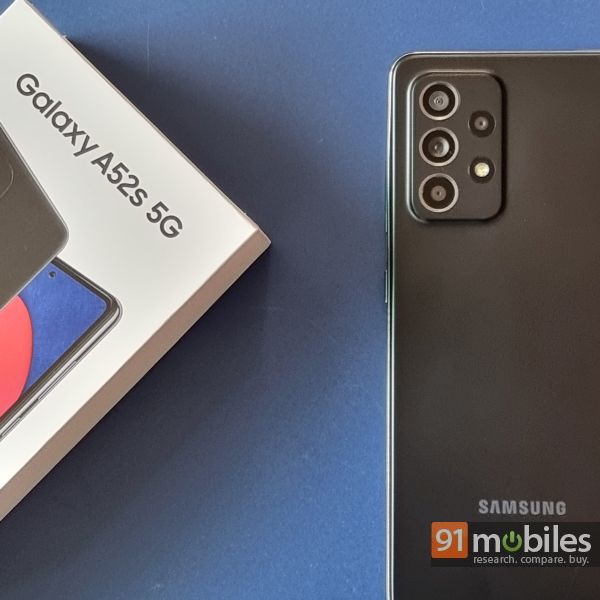
Case in point, the Samsung Galaxy M52 5G (review) which, for all intents and purposes, comes across as a more affordable Samsung Galaxy A52s 5G (review). On paper, both the phones draw a lot of parallels so today, let’s see if you should spend Rs 10K more on the A52s, or just save some bucks and get the M52 5G instead.
Design
No surprises here, the Samsung Galaxy A52s 5G touts a more premium design as compared to the Galaxy M52 5G. While both the phones ship with a plastic back, the Galaxy A52s’ chassis feels denser and imparts a more premium in-hand feel. Furthermore, I might be preaching to a choir here but the Galaxy A52s’ matte finish is a notch above the M52 5G’s glossy varnish. It also helps that the Samsung Galaxy A52s is among the handful of phones under Rs 40K to ship with IP67 certification. Rest assured, the A52s is undoubtedly a more sturdy phone to use day in and day out.

Now, the Galaxy M52 5G does have a few aces up its sleeve and the phone is noticeably lighter and slimmer than the Galaxy A52s. In fact, the phone is just 7.4mm thick and weighs in at just 173 grams. On the contrary, the Galaxy A52s tips the scales at 189 grams. Ergo, if you were on the lookout for an affordable, lightweight Samsung phone, the Galaxy M52 5G might fit the bill better. I’d also like to add that while both the phones offer facial recognition, the M52 5G ships with a capacitive fingerprint sensor as opposed to the A52s’ in-display version. I actually prefer physical fingerprint sensors too, as they can unlock a phone much quicker. Heck, even registering fingerprints takes less time on the M52 5G than it does on the A52s. A fringe benefit of the same is also that you won’t smudge the screen with your finger stains every time you have to unlock the device.
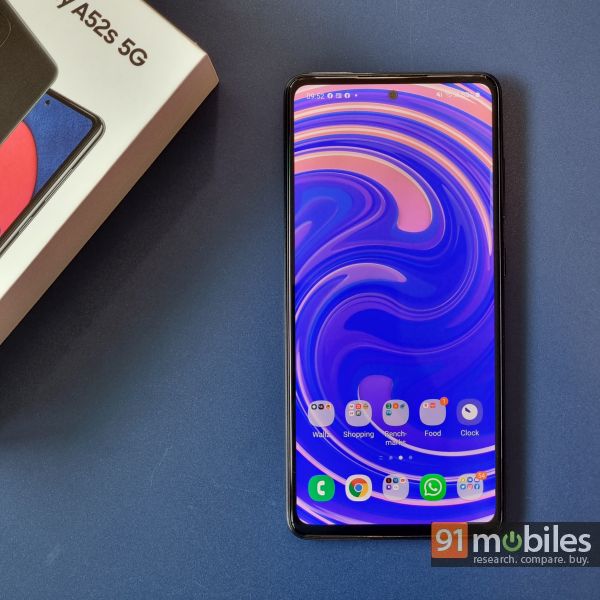
Moving on, the Samsung Galaxy A52s one-ups its more affordable sibling as it comes with a headphone jack – I suppose the handset’s added girth allowed Samsung to furnish the phone with an analogue connector. On the contrary, the M52 5G doesn’t feature a headphone jack so, you’ll have to rely on a pair of Type-C or Bluetooth earphones when you don’t feel like blasting music from the phone’s speakers. Speaking of which, the Galaxy A52s also ships with a dual-speaker setup. On the other hand, buyers eyeing the M52 5G will have to contend with a single mono-firing speaker, so rest assured, the A52s definitely has an edge in the audio department.
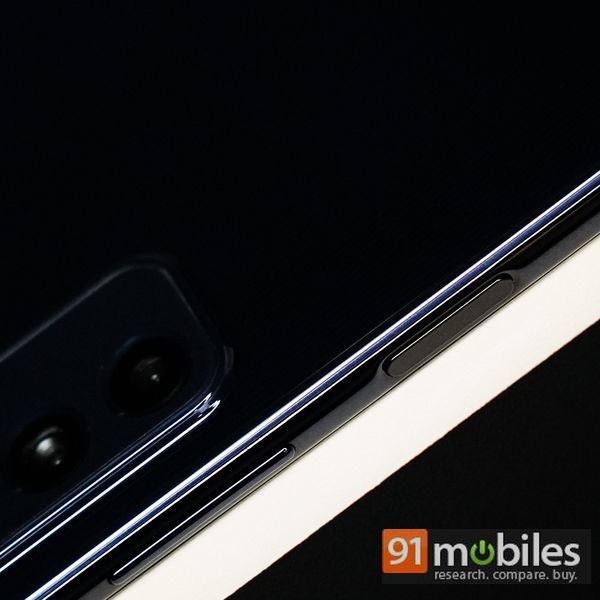
Before I wrap up the design section, here are some more tidbits that set the two devices apart –
- Both the phones could have tighter haptics, but if I had to pick between the lesser of two evils, I’d opt for the Galaxy A52s.
- The duo draw parallels in terms of button placement too and I found the physical toggles equally tactile on the two handsets. That said, despite shipping with a taller frame, the M52 5G felt more one-hand friendly, which can be accredited to the handset’s lightweight chassis.
- Both the phones ship with a USB Type-C port for charging. Disappointingly, the handsets ship with a 15W “fast-charger” in the box. Moreover, the devices don’t support wireless charging either.
Display
Samsung has a penchant for making gorgeous displays and the company has furnished its latest mid-rangers with excellent panels too. Both the Samsung Galaxy A52s and the Galaxy M52 5G ship with Super AMOLED displays that refresh at 120Hz. The devices also feature a layer of Corning’s Gorilla Glass v5 on top of their displays, and the panels on both the phones tout a peak brightness of 800 nits.

That said, the screen on the M52 5G is a tad bigger at 6.7-inches, whereas the A52s ships with a more modest 6.5-inch panel. However, both the screens are a treat to look at and exhibit similarly punchy hues and replicate deep, dark blacks. Furthermore, the displays on both phones are bordered by equally sleek bezels and the panels also ship with a punch-hole notch, ensuring you don’t get distracted whilst consuming media on either of the two devices.
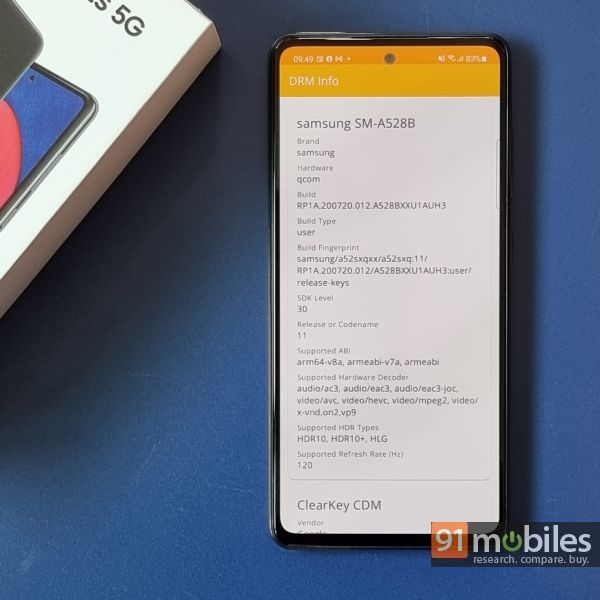
During my testing, I didn’t run into any instances of jitter whilst navigating through the UI on the two phones – app animations were brisk and the panels picked up on my swipes and gestures seamlessly. I did notice that the display on the Galaxy A52s had a cool tint, whereas the one on the M52 5G swayed in favour of warmer tones. That said, both the devices will let you tweak the colours to your liking, so no harm, no foul. Unfortunately, while both the phones allow users to stream HDR content over YouTube, you’ll only be able to stream in HD quality from OTT services like Netflix. That’s quite disappointing, seeing how the competition allows buyers to relay content in the highest quality.
Performance and Software
On to the performance and here, both our contenders are backed by Qualcomm’s Snapdragon 778G processor. The handsets ship with LPDDR4x memory and UFS 2.1 storage so, spec-wise, the phones are neck and neck. Unsurprisingly, the devices yielded similar results in synthetic benchmarking apps too. You can refer to the gallery below to get a number on their performance chops. Interestingly, the Galaxy M52 5G’s plastic chassis throttled a tad less than the A52s when subjected to a sustained load. Moreover, I noticed that the A52s would run a tad warmer than its lesser-priced sibling when gaming on the phones too. Understandably, the temperature disparity between the two phones wasn’t night and day but it’s still something to take note of.
It goes without saying that both the phones will run games at the same graphics and frame rate settings. To give you a better picture, I tested the duo with BGMI and both the handsets could run the title at HDR graphics and Ultra frame rate preset. You can run the game at 60fps (Extreme preset) on the two phones too, however, you’ll have to drop the graphics setting to ‘Smooth’ on the handsets. Now, do note that neither of the two devices can run the game at 60fps in its entirety. In particular, the M52 5G dropped the in-game frames to 53fps after around 20 minutes of gaming.
While I did run into frame drops on the A52s as well, the handset still, for the most part, ran the game at 60fps – I suppose the phone’s thicker chassis has given the processor some more room to breathe. Of course, if you don’t plan on playing a lot of games on your next phone then you’ll find little to complain about from either of the two handsets.
The same is true for software too and barring a select few apps from Samsung, the likes of which include the company’s GoodLock utility, etc, both the phones will offer a similar software experience that’s replete with features like Knox security, gesture-based navigation, screen-off gestures, the works. Unfortunately, both the phones also ship with a ton of bloatware. In fact, you’ll spend more time clearing the clutter from the M52 5G as it comes bundled with third-party apps like Moj, Koo etc which aren’t present on the A52s.

The Samsung Galaxy M52 5G ships with a 5,000mAh cell, whereas the A52s gets a 4,500mAh battery. In theory, the M52 5G should last users longer, though I noticed that both the phones required a top-up by the time I hit the sack. So, while you could squeeze out a bit more juice from the M52 5G, I doubt it’ll be leagues ahead of what you’d get with the A52s.
Cameras
The Samsung Galaxy A52s and the Galaxy M52 5G draw parallels in the camera department too. In fact both, the M52 5G as well as the A52s ship with a 64MP main sensor that works alongside a 12MP ultrawide sensor with a 123-degree FoV and a 5MP macro sensor. For selfies, both phones get a 32MP selfie camera. Additionally, the A52s gets a 5MP depth sensor too.


So, how do the phones perform? Well, the Galaxy A52s put forth nicer-looking photos during the day with better sharpness and less noise. As an example, if you look at the image slider attached above then you’ll notice that the M52 5G introduces a lot of noise near the generator and the barbed wires around the stone fence. On the flip side, the A52s’ image was much sharper. In fact, I noticed that the A52s had better sensor details across the board. That said, the A52s’ image had a bluish tint to it.


As another example, I’d like you to turn your attention to the flower pot positioned towards the bottom-left of the frame in this next comparison shot. Here, you’ll notice that the leaves have much sharper definition on the A52s’ photo. Moreover, the gravel on the pavement has much better texture on the Galaxy A52s’ composition too.


Interestingly, the A52s’ wide-angle shots have better visibility across the board and it’s evident that the phone is able to bring out the details from the highlights and the shadows equally well. That said, the images do have a bit of noise around the centre of the frame. The M52 5G, on the other hand, opts for a more contrasty look and correspondingly, you’ll notice that the leaves and the bark of trees appear darkened in the handset’s shots.


While the two phones output similar-looking photos during the day, at night, the Galaxy A52s’ snagged a commanding lead. In fact, with the night mode disabled, the A52s’ image wasn’t just brighter, but it was a tad sharper too. With the night mode enabled, the M52 5G’s composition still appeared soft and the decorative items in the background had lesser definition compared to what I got with the Galaxy A52s.
The macro images and the selfies net very similar results from the two handsets. I have the samples attached in a gallery so take a gander and comment on any differences you notice below.
Verdict
At the time of writing this article, the Samsung Galaxy M52 5G and the Samsung Galaxy A52s 5G retail for Rs 24,999 and Rs 35,999 respectively. Seeing how the phones are backed by the same processor, offer similar software experience, indistinguishable displays and the same camera stack, what exactly do you get if you pay Rs 10K more for the Galaxy A52s? Well, for starters, the A52s offers a nicer, more sturdy design along with a better audio setup. Moreover, the handset’s cameras are a notch above what you’d get with the Galaxy M52 5G too.
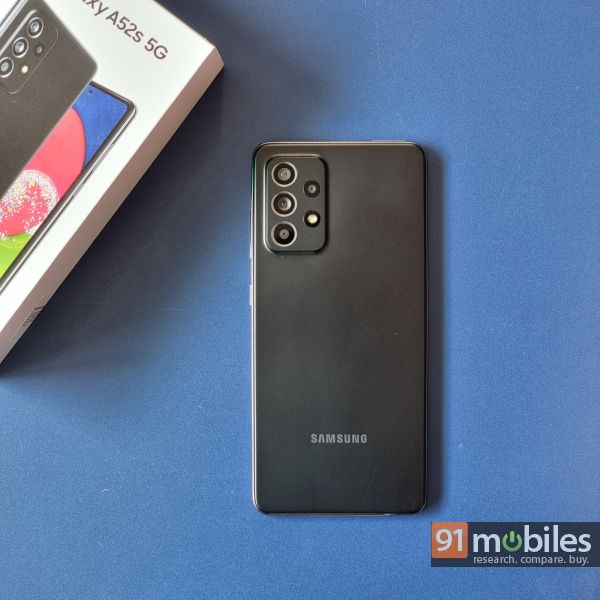
That said, the M52 5G offers a beefier battery in a sleeker chassis. Moreover, the handset’s performance is on par with the Galaxy A52s. Admittedly, the Galaxy A52s is slightly better for gaming, but the difference isn’t night and day. So, if you are a smartphone enthusiast who tends to take note of the slightest difference in performance, or pixel-peeps the photos snapped by a phone, then you should invest in the Galaxy A52s. If not, then the Galaxy M52 5G should suffice for all your needs, and then some.
For all the latest Technology News Click Here
For the latest news and updates, follow us on Google News.
